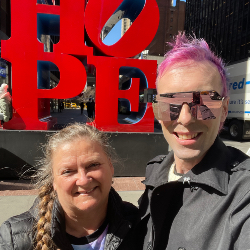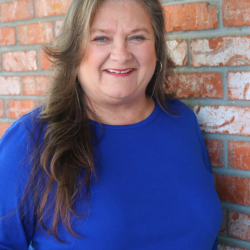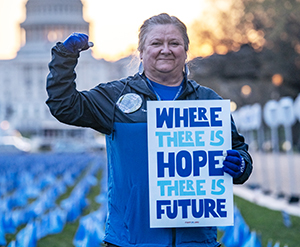Tami Pangelina
Caregiver |
Colon - Stage IV |
Age at Diagnosis:
My nephew, Daniel, a talented makeup artist from the Bay Area, battled stage IV colon cancer. His journey began in 2017 when he was misdiagnosed multiple times in Las Vegas. His signs and symptoms included rectal bleeding or blood in stool, ongoing change in bowel habits, stomach cramps/bloating/fullness, and fatigue. Initially, they thought he had Crohn’s disease, then appendicitis, then colitis, and later diverticulitis. Finally, in April 2018, they discovered he had colon cancer during surgery to address the diverticulitis. Despite undergoing chemotherapy and radiation, the cancer returned. Daniel underwent further surgery and treatment, but the cancer persisted.
In April 2021, while recovering from a car accident in Wyoming, a mass was found in his stomach. Back in Las Vegas, he faced the devastating news of a fistula and a hole between his bladder and colon, causing immense pain and complications. Several hospitals declined his case until UCLA accepted and performed a 14-hour surgery that would remove the cancer ridden bladder, although they couldn’t remove all the cancer. Daniel fought bravely for one more year with us by his side and myself being his caregiver, living with me and my husband, until his passing on November 26, 2022.
If you’re afraid to seek medical advice or colorectal cancer screening, it’s important to prioritize your health. Educate yourself about colorectal cancer and the benefits of early detection. Talk to a trusted person who can provide support and reassurance.
Find a compassionate health care provider who can address your anxieties. Take small steps, such as scheduling an appointment with your primary care physician, and gradually familiarize yourself with the screening process. Seek emotional support if needed and focus on the potential benefits of early detection. Remember that time is crucial, and delaying can increase risks. Consult with a health care professional for personalized guidance.


Tami Pangelina
Caregiver |
Colon - Stage IV |
Age at Diagnosis:

My nephew, Daniel, a talented makeup artist from the Bay Area, battled stage IV colon cancer. His journey began in 2017 when he was misdiagnosed multiple times in Las Vegas. His signs and symptoms included rectal bleeding or blood in stool, ongoing change in bowel habits, stomach cramps/bloating/fullness, and fatigue. Initially, they thought he had Crohn’s disease, then appendicitis, then colitis, and later diverticulitis. Finally, in April 2018, they discovered he had colon cancer during surgery to address the diverticulitis. Despite undergoing chemotherapy and radiation, the cancer returned. Daniel underwent further surgery and treatment, but the cancer persisted.
In April 2021, while recovering from a car accident in Wyoming, a mass was found in his stomach. Back in Las Vegas, he faced the devastating news of a fistula and a hole between his bladder and colon, causing immense pain and complications. Several hospitals declined his case until UCLA accepted and performed a 14-hour surgery that would remove the cancer ridden bladder, although they couldn’t remove all the cancer. Daniel fought bravely for one more year with us by his side and myself being his caregiver, living with me and my husband, until his passing on November 26, 2022.
If you’re afraid to seek medical advice or colorectal cancer screening, it’s important to prioritize your health. Educate yourself about colorectal cancer and the benefits of early detection. Talk to a trusted person who can provide support and reassurance.
Find a compassionate health care provider who can address your anxieties. Take small steps, such as scheduling an appointment with your primary care physician, and gradually familiarize yourself with the screening process. Seek emotional support if needed and focus on the potential benefits of early detection. Remember that time is crucial, and delaying can increase risks. Consult with a health care professional for personalized guidance.


Live in the present moment: Focus on the present and savor the beauty of each moment. Avoid dwelling on the past or worrying excessively about the future. Mindfulness can help you find peace and joy in the here and now.
Tami Pangelina
Caregiver |
Colon - Stage IV |
Age at Diagnosis:

My nephew, Daniel, a talented makeup artist from the Bay Area, battled stage IV colon cancer. His journey began in 2017 when he was misdiagnosed multiple times in Las Vegas. His signs and symptoms included rectal bleeding or blood in stool, ongoing change in bowel habits, stomach cramps/bloating/fullness, and fatigue. Initially, they thought he had Crohn’s disease, then appendicitis, then colitis, and later diverticulitis. Finally, in April 2018, they discovered he had colon cancer during surgery to address the diverticulitis. Despite undergoing chemotherapy and radiation, the cancer returned. Daniel underwent further surgery and treatment, but the cancer persisted.
In April 2021, while recovering from a car accident in Wyoming, a mass was found in his stomach. Back in Las Vegas, he faced the devastating news of a fistula and a hole between his bladder and colon, causing immense pain and complications. Several hospitals declined his case until UCLA accepted and performed a 14-hour surgery that would remove the cancer ridden bladder, although they couldn’t remove all the cancer. Daniel fought bravely for one more year with us by his side and myself being his caregiver, living with me and my husband, until his passing on November 26, 2022.
If you’re afraid to seek medical advice or colorectal cancer screening, it’s important to prioritize your health. Educate yourself about colorectal cancer and the benefits of early detection. Talk to a trusted person who can provide support and reassurance.
Find a compassionate health care provider who can address your anxieties. Take small steps, such as scheduling an appointment with your primary care physician, and gradually familiarize yourself with the screening process. Seek emotional support if needed and focus on the potential benefits of early detection. Remember that time is crucial, and delaying can increase risks. Consult with a health care professional for personalized guidance.


Live in the present moment: Focus on the present and savor the beauty of each moment. Avoid dwelling on the past or worrying excessively about the future. Mindfulness can help you find peace and joy in the here and now.
Share this Story!




